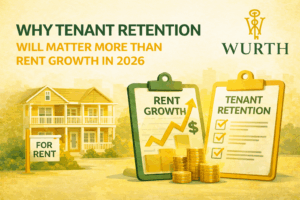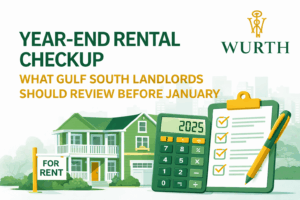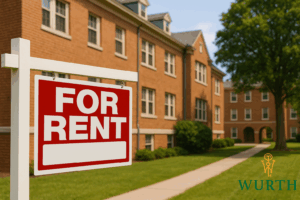
Imagine your rental property could talk. Not just creak and groan when the HVAC wheezes to life, but actually talk. What would it say?
Well, for starters, probably something like:
“Hey. It smells weird in here. Fix it.”
But beyond that, your rental might have some surprisingly sharp insights. If you’re a landlord, you know a property has a way of telling you things, through leaks, tenant complaints, or surprise expenses. The trick is learning how to actually listen.
Let’s walk through what your property might be trying to tell you (in its own sarcastic little voice) and what that means for you as an investor or landlord who doesn’t have time to babysit drywall.
“I’m not a self-cleaning oven, you know.”
You wouldn’t believe how many landlords skip regular maintenance and assume everything’s peachy because no one’s called to complain. But silence doesn’t always mean success. It might mean tenants have just given up.
According to a study by Buildium, 58% of renters say maintenance is the number one factor influencing their satisfaction. That’s not a small number. Your property is practically begging for seasonal inspections, routine upkeep, and prompt repairs. Not because it’s needy. But because, if ignored, little issues become major money pits.
And look, no one wants to get that midnight call about a burst pipe. But if your property had a voice, it would probably say, “That pipe’s been whispering for months. You just didn’t listen.”
“Can we talk about my curb appeal for a second?”

If your rental could look in a mirror, would it cringe? First impressions matter. In fact, 76% of potential renters say the exterior appearance of a property is a major factor in whether they bother to look inside. That’s not just vanity. That’s business.
Overgrown hedges. Peeling paint. A front door that’s seen better centuries. These little things add up. They send a message before you ever say a word. Something along the lines of, “This place is tired, and maybe so is the person managing it.”
Property managers get this. The good ones will have landscaping vendors, maintenance checklists, and the bandwidth to keep your property from looking like the neighborhood’s cautionary tale.
“Why do you always wait until I’m falling apart to pay attention to me?”
Deferred maintenance. It sounds innocent enough. Like maybe you’re just being economical. But the truth is, letting repairs slide almost always costs more in the end. That weird drip? It’s not just a minor leak. It’s mold’s welcome mat.
According to some recent research, every dollar spent on preventative maintenance saves up to $4 in future repair costs. So yeah. Your property isn’t just whining. It’s trying to save you money.
And if you’re not on-site or just don’t have the time to micromanage every loose shingle and suspicious stain, a property manager can be your second set of eyes (and ears). One that doesn’t need coffee or weekends off.
“These tenants aren’t bad people. They’re just not being heard.”
You ever have a friend complain about a manager at work and think, “That manager probably has no idea they’re the problem”? Same thing here.
Most tenant complaints aren’t about unreasonable things. They’re about feeling ignored. Unacknowledged maintenance requests. Unanswered emails. Slow follow-up. Over time, that builds frustration and turnover.
Turnover is expensive. You’re not just losing a tenant. You’re paying for cleaning, marketing, vacancy, and possibly repairs you didn’t even know were needed until they moved out and took the blinds with them.
A property manager is often better equipped to communicate quickly and professionally. They’ve got the systems. You’ve got your Saturdays back.
“I can be a great investment. But I’m not a set-it-and-forget-it stock.”
Real estate is tangible. That’s one of its biggest appeals. You can drive past it. You can stand inside it. But you also have to deal with it.
A rental property, left to its own devices, won’t increase in value out of goodwill alone. It needs upkeep. Attention. Strategic upgrades.
Maybe that means energy-efficient appliances to attract better tenants. Maybe it means replacing carpet with something that doesn’t stain when someone just thinks about red wine. These things don’t just protect your investment. They improve it.
To be fair, you probably didn’t buy a rental property to learn the joys of grout maintenance. So delegate where it makes sense. A professional property manager can help you identify improvements that actually boost ROI, not just drain your budget with shiny upgrades no one asked for.
“Listen, I know I’m not perfect. But I’ve got potential.”
Every property has its quirks. A hallway that’s too narrow. Cabinets that were clearly installed by someone who had beef with right angles. But if you take the time to hear what your property is trying to tell you, through tenant behavior, maintenance needs, and curb appeal complaints, you can turn it into something special.
Not just a monthly income stream, but a well-oiled, semi-independent asset that pays you back for listening.
And if you ever feel like your rental is speaking a language you just don’t have time to learn, it might be time to call in a translator. Preferably one with vendor contacts, conflict-resolution skills, and a deep love of Google Sheets.
Wurth Property Management can help with that. We speak fluent rental, and more importantly, fluent tenant.






